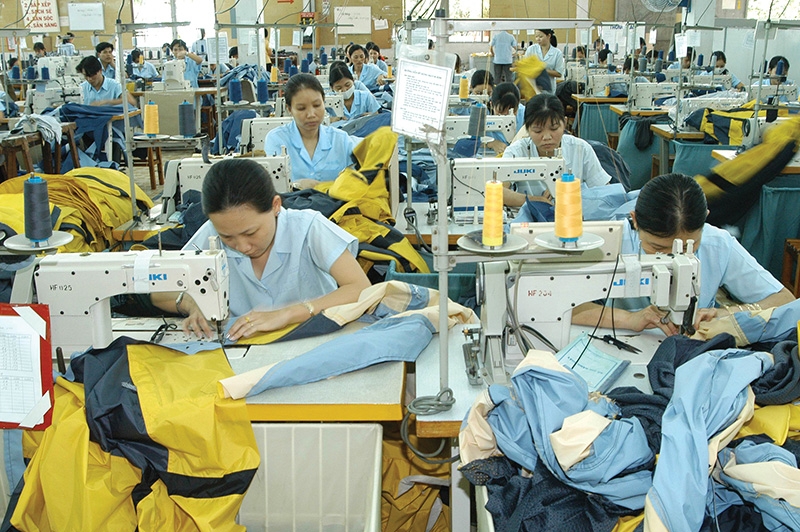Tax tweak puts strain on apparel makers
 |
| Apparel makers trading on spot are not eligible for import duty exemptions. Photo: Le Toan |
The government issued Decree No.18/2021/ND-CP on March 11, amending a previous 2016 decree to implement the Law on Export and Import Taxes. Now, products traded on spot are not eligible for import duty exemptions.
Goods exported or imported on the spot are goods which are produced in Vietnam and sold to foreign traders right on Vietnamese territory.
The regulation could adversely affect foreign-invested enterprises (FIEs). One foreign footwear producer told VIR that it calculated it may have to pay an estimated advance tax of VND320 billion ($13.9 million).
In addition to FIEs, local textile and footware producers are voicing their concerns about the new regulation, which could see then having to pay tax for the same kind of product.
The impact on each company varies depending on the number of their imported materials. Tran Nhu Tung, chairman of the board at Thanh Cong Textile Garment Investment Trading JSC told VIR, “The new regulation directly affects the cashflow of the company, which has to borrow bank loans to make duty payments and pay interest for 7-12 months before tax refund. At present, we are assigning employees to monitor and prepare the documents for tax finalisation and refund.”
The regulation is being deemed a step backwards for the government’s efforts to support textile and garment firms by joining numerous free trade agreements (FTAs) such as the EU-Vietnam FTA and the Comprehensive and Progressive Agreement for Trans-Pacific Partnership (CPTPP), according to Tung.
“Businesses need to meet the yarn-forward rule of origin for the CPTPP and the fabric-forward rule of origin for the EVFTA to enjoy tariff reductions. However, the new regulation does not encourage companies to use locally-sourced materials,” he added. “They will prefer to purchase materials overseas rather than investing in local material production.”
He also worried about the rising tax-based fees to lower the financial capacity and competitiveness of local players in the international market, especially with higher prices for finished products. Thanh Cong is exporting its products to the United States, South Korea, and Europe, which are the key export markets for Vietnam’s textile and garment industry.
“We have yet to access any COVID-19 relief packages from the government,” Tung added. “With additional duty payment, Thanh Cong has to balance its investments while mobilising other resources to minimise the impact of the pandemic. Following the recent flare up of cases in the north, Thanh Cong has social distancing practices to ensure the safety of nearly 8,000 workers.”
Under Decree 18, both exporters and importers have to pay duty rates for on-spot import-export goods. Nguyen Bao Tran, general director of Tex-Giang, said that the company has received the guidance of the General Department of Vietnam Customs on the implementation of Decree 18. With the new decree, it means businesses will not receive any support from the government in terms of administrative reform, which will make production and business activities more difficult and expensive.
According to Tran, the immediate duty payment fails to encourage companies to switch from outsourcing to free-on-board production to increase the added value. Moreover, it often takes around one year for companies to import materials for production as well as complete documents on export and tax refund. The one-year suspension for duty refunds creates a huge financial waste for businesses.
Indeed, Decree 18 aimed to target a few local material producers but it now affects 95 per cent of garment and footwear firms. The decree does not encourage exported goods, causing inequality between outsouring production and export activities.
As the pandemic rumbles on, textile and footwear organisations have made objections to the new rules (see quotes). The industry had previously proposed the removal of the 10 per cent VAT payment for the purchase of domestic raw materials. However, it has yet to receive the green light. This, coupled with the additional duty for on-spot export, creates more challenges for businesses.
The prime minister issued a directive to review overlapping and inadequate documents causing difficulties for businesses earlier this month.
The textile and footwear industry generates employment for about five million workers. Leaders of business associations are calling for the government’s attention to the issuance of Decree 18 to address the policymaking process. In particular, review of the regulations will help attract more foreign manufacturers to relocate their businesses to Vietnam.
| Phan Thi Thanh Xuan - Secretary general, Vietnam Leather, Footwear, and Handbag Association
The main target of the regulation imposing import duty on locally-sourced materials used for export production under Decree 18 is aiming at preventing trade fraud and tax evasion by local businesses engaging in materials and accessories production. In fact, more than 90 per cent of businesses in the footwear sector take part in export production, so the application of the regulation has put big pressure on those with negative impacts on their production and business practice. They are held in passive position as they do not have available money to pay for the new tax line as the regulation rules that businesses need to pay the tax right after completing purchases of materials. Under our estimation, on-the-spot export accounts for about 15 per cent of the total product volume of the footwear sector. With a total value of $22 billion, this export value would amount to $3.3 billion, equal to nearly $600 million worth in the tax value to be imposed on locally-sourced materials for export production. This sum means businesses need to borrow at banks with annual interest rate surpassing 10 per cent. Currently, there are businesses using local materials for export production that have taken millions of US dollars in bank loans for payment of this kind of tax. As per regulation, they will get the tax refund after nearly a year, yet the tax refund procedures are by no mean simple. The government has encouraged the local footwear sector to spur supporting industry development to become self-reliant on production. This regulation, however, goes counter to this will, even stimulating material import as it is a tax exemption. The government therefore needs to soon take measures to revise or annul the regulation helping them to maintain stable production and business. Vu Duc Giang - Chairman, Vietnam Textile and Apparel Association
Our association has conveyed documents to the Government Office and relevant agencies reflecting on current impediments pertaining to tax policies and custom procedures upon implementing Decree 18. The decree needs to clarify two points. Firstly, does local materials serving export-oriented production subject to import duty include the materials provided by businesses from export processing zones and non-tariff zones? And secondly, does the tax refund scheme apply if local materials and accessories are imported to serve export-oriented production and in fact have supplied the products to foreign traders, even if the foreign traders are not those based on export processing zones and non-tariff zones? Currently, businesses in the sector are facing difficulties as current customs system does not support automated declaration following forms 23 and 24. They must make their declarations following form 18a and need to go back and forth to customs offices to complete their procedures. This goes counter to the spirit of revised Circular No.38/2015/TT-BTC issued in 2015 on simplifying procedures for businesses. As the pandemic situation shows growing complication with major impacts on the production and business in the entire sector, we propose amending regulations in the direction of giving tax exemptions to locally-sourced materials serving export production, thus encouraging businesses to shift into export production under the free-on-board form instead of simply carrying out export processing based on foreign client orders. |
| Decree No.18/2021/ND-CP dated March 11, 2021, which supersedes Decree No.134/2016/ND-CP dated 2016, rules that on-spot export items are not eligible for export duty exemption. On-spot export traders need to make customs declarations, including declaration on export duty payment following the rate and the taxable value of on-spot export items regulated at the time of making their customs declarations. The decree also rules that on-spot import materials and accessories registered at customs offices as being imported to serve export processing shall be exempted from import duty, if the import traders satisfy requirements set in the decree. Otherwise, the traders need to make customs declarations and pay import duty following the rate and the taxable value of on-spot import materials and accessories regulated at the time of making their declarations. |
What the stars mean:
★ Poor ★ ★ Promising ★★★ Good ★★★★ Very good ★★★★★ Exceptional
Related Contents
Latest News
More News
- VNPAY and NAPAS deepen cooperation on digital payments (February 11, 2026 | 18:21)
- Vietnam financial markets on the rise amid tailwinds (February 11, 2026 | 11:41)
- New tax incentives to benefit startups and SMEs (February 09, 2026 | 17:27)
- VIFC launches aviation finance hub to tap regional market growth (February 06, 2026 | 13:27)
- Vietnam records solid FDI performance in January (February 05, 2026 | 17:11)
- Manufacturing growth remains solid in early 2026 (February 02, 2026 | 15:28)
- EU and Vietnam elevate relations to a comprehensive strategic partnership (January 29, 2026 | 15:22)
- Vietnam to lead trade growth in ASEAN (January 29, 2026 | 15:08)
- Japanese business outlook in Vietnam turns more optimistic (January 28, 2026 | 09:54)
- Foreign leaders extend congratulations to Party General Secretary To Lam (January 25, 2026 | 10:01)



 Tag:
Tag:




















 Mobile Version
Mobile Version